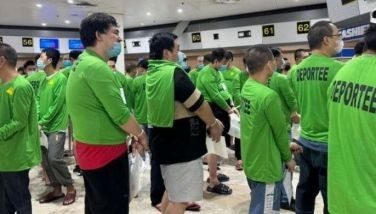(UPDATE) SC asked to nullify military access pact with US
MANILA, Philippines (Xinhua) - As earlier predicted by some quarters, the Enhanced Defense Cooperation Agreement (EDCA) signed on April 28 by the Philippines and the US would have a rough sailing before it can be implemented, if ever it could be implemented at all.
On Monday, two former senators, Wigberto Tanada and Rene Saguisag, joined 10 other petitioners who questioned before the Supreme Court the constitutionality of EDCA and its implication on Philippine sovereignty and national interest.
The petitioners asked the country's highest court to stop the implementation of the accord pending the resolution of the petition for certiorari or review of the legality of the agreement. They asked the court to declare the agreement unconstitutional for violating several provisions of the 1987 Constitution.
"This agreement will effectively allow the US to establish and operate de facto military bases anywhere on Philippine soil, minus the cost of paying for one," the petitioners said.
In l991, Senators Tanada and Saguisag, along with 10 other senators, voted against the extension of the lease of the Subic Naval Base in Zambales province and Clark Air Base in Pampanga province, north of Manila.
The extension of the lease for another 10 years of the two American military facilities, the biggest in Asia, was initiated by then President Corazon Aquino, the late mother of now President Benigno Aquino III.
President Aquino has said that EDCA can stand scrutiny amid critics questioning its constitutionality. "We are reasonably confident that anybody looking at it objectively will be able to say that we have met all the stipulations in the Constitution," Aquino told the media on the sidelines of the recently-held 24th Association of Southeast Asian Nations Summit in Myanmar.
The president said it was expected that some sectors would try to derail the agreement between the Philippines and the US
The petitioners said that EDCA is an affront to the country's national interest and is lopsided in favor of the US compared with other agreements Washington has signed with its other allies.
They said that with EDCA, not only is the Philippines not receiving any remuneration for allowing US presence in the country, it is committed to making all efforts to facilitate US presence in the country, including providing security for the facilities, equipment, supplies and other war materiel.
The petitioners claimed that the agreement has made the country a "target of US enemies" because US military facilities located here can be considered effectively contributing to US military action.
They said that the agreed locations for the bases could be "put in harm's way if the US enters into an international armed conflict even if the potential US conflict is not geographically in the Philippines."
Among the provisions of the Constitution that were violated by EDCA is the prohibition on nuclear weapons in the country. The petitioners said there was "no absolute" statement in EDCA that prohibits the entry of nuclear weapons into the country, only saying that it disallows the prepositioning of nuclear weapons.
Earlier, Bayan Muna (Country First) Representative Neri Colmenares said that EDCA would make the Philippines "the biggest US military base in the world."
"This will make the Philippines the biggest (US) military base in the world. By the stroke of a pen, through EDCA, the Aquino government ceded all Philippine sovereignty to the US and make us second class citizens in our own country. This agreement is very unequal and extremely disadvantageous to Filipino interests," Colmenares said.
Earlier, Senator Miriam Defensor Santiago said that she is confident that the Supreme Court would declare EDCA unconstitutional.
"An agreement signed by a defense secretary and a US ambassador should not be the new normal. It should be declared abnormal, because of the particular importance of EDCA in the context of our Constitution," Santiago said in a statement.
An international law expert, Santiago said that under international law, the heads of state are the ones who should sign "treaties of particular importance" and if representatives are sent to sign on their behalf, they need to show a formal document known as "full powers."
Santiago said that Defense Secretary Voltaire Gazmin and US Ambassador Philip Goldberg, who signed EDCA, did not present any document showing that they were given full powers.
She added that EDCA should have been submitted first to the Senate for ratification.
EDCA was rushed for signature by Gazmin and Goldberg a few hours before the arrival of US President Barack Obama for an overnight stay in Manila on April 28.
- Latest
- Trending






























